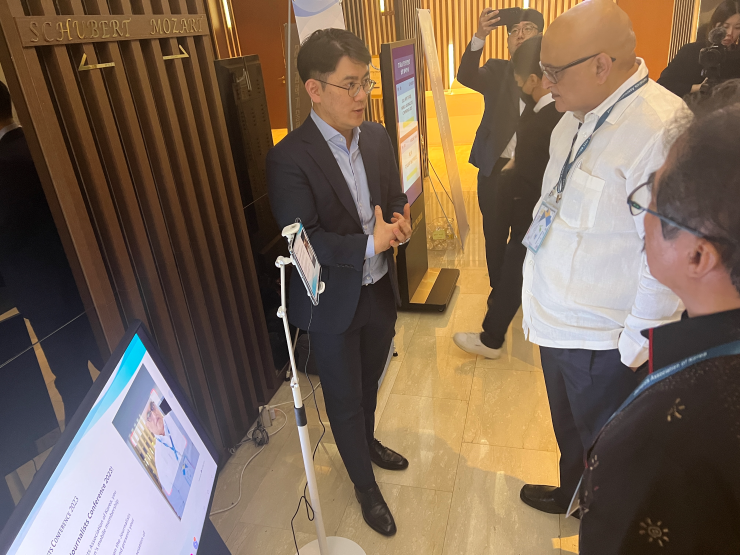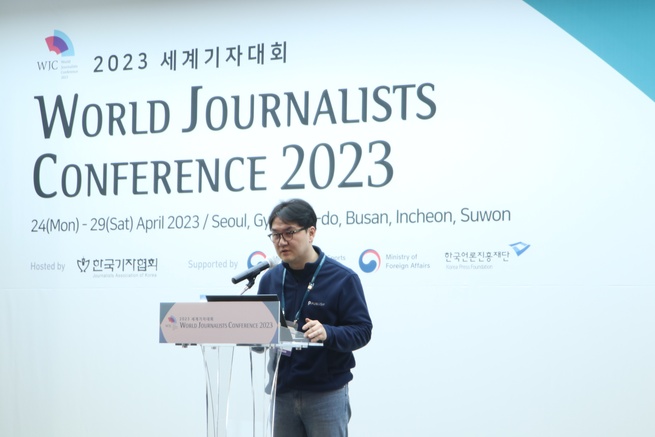SEOUL, South Korea — In a keynote speech at the 11th annual World Journalists Conference in Seoul, Sonny Kwon, CEO of PUBLISH, shared his vision for the future of journalism, highlighting the potential of blockchain technology to transform the industry. Kwon proposed a new revenue model for media outlets that utilizes a token reward system and ecosystem to increase reader engagement, while also combatting fake news and promoting transparency.
Kwon emphasized the need to restructure the revenue structure of media outlets and highlighted the potential of blockchain technology to promote transparency and combat the spread of fake news. He introduced blockchain technology as a solution to the problems faced by news media and described the publishing protocol ecosystem as a potentially sustainable community and system.
The token reward system proposed by Kwon would reward readers for activities such as reading, sharing, and commenting, creating an environment where journalism could focus on journalistic pursuits rather than news production for traffic. This would reduce the distribution stage of advertisements to increase efficiency.
PUBLISH has collaborated with the Korea Journalist Association to build the world's first decentralized, contactless identity verification system for journalists. Kwon highlighted the limitations of plastic press cards issued by many journalist associations worldwide and proposed the DID press card issued by PUBLISH as a more stable and secure alternative.
Kwon also noted that media outlets can expect to improve their revenue through blockchain technology by creating non-fungible tokens (NFTs) as an additional source of income. News articles and photos can be converted into NFTs, proving ownership and originality and allowing for efficient transactions.
Finally, Kwon explained that the reward system for readers will not diminish the quality of journalism or the media industry but instead provide a way to approach readers more intimately and transform them from "simple consumers or spectators" into active "stakeholders" who can share value in various ways.
 In the photo, a PUBLISH representative is demonstrating the Korea Journalist Association's decentralized identity verification (DID) press card to attendees.
In the photo, a PUBLISH representative is demonstrating the Korea Journalist Association's decentralized identity verification (DID) press card to attendees.
The conference, which drew over 70 journalists from 50 countries, offered a platform for journalists from around the world to discuss pressing issues facing the journalism industry. The focus of this year's event was to explore the coexistence and development of local regions and journalism and to discuss the future of journalism in the digital age. Kwon's speech, entitled "Blockchain-Based News Ecosystem," showcased the potential of blockchain technology to transform the journalism industry, leaving attendees with much to consider.



 Nvidia, ByteDance, and the U.S.-China AI Chip Standoff Over H200 Exports
Nvidia, ByteDance, and the U.S.-China AI Chip Standoff Over H200 Exports  SpaceX Reports $8 Billion Profit as IPO Plans and Starlink Growth Fuel Valuation Buzz
SpaceX Reports $8 Billion Profit as IPO Plans and Starlink Growth Fuel Valuation Buzz  Nvidia Nears $20 Billion OpenAI Investment as AI Funding Race Intensifies
Nvidia Nears $20 Billion OpenAI Investment as AI Funding Race Intensifies  Sony Q3 Profit Jumps on Gaming and Image Sensors, Full-Year Outlook Raised
Sony Q3 Profit Jumps on Gaming and Image Sensors, Full-Year Outlook Raised  SoftBank Shares Slide After Arm Earnings Miss Fuels Tech Stock Sell-Off
SoftBank Shares Slide After Arm Earnings Miss Fuels Tech Stock Sell-Off  Jensen Huang Urges Taiwan Suppliers to Boost AI Chip Production Amid Surging Demand
Jensen Huang Urges Taiwan Suppliers to Boost AI Chip Production Amid Surging Demand  Nintendo Shares Slide After Earnings Miss Raises Switch 2 Margin Concerns
Nintendo Shares Slide After Earnings Miss Raises Switch 2 Margin Concerns  Oracle Plans $45–$50 Billion Funding Push in 2026 to Expand Cloud and AI Infrastructure
Oracle Plans $45–$50 Billion Funding Push in 2026 to Expand Cloud and AI Infrastructure  SpaceX Prioritizes Moon Mission Before Mars as Starship Development Accelerates
SpaceX Prioritizes Moon Mission Before Mars as Starship Development Accelerates  Google Cloud and Liberty Global Forge Strategic AI Partnership to Transform European Telecom Services
Google Cloud and Liberty Global Forge Strategic AI Partnership to Transform European Telecom Services  OpenAI Expands Enterprise AI Strategy With Major Hiring Push Ahead of New Business Offering
OpenAI Expands Enterprise AI Strategy With Major Hiring Push Ahead of New Business Offering  Elon Musk’s Empire: SpaceX, Tesla, and xAI Merger Talks Spark Investor Debate
Elon Musk’s Empire: SpaceX, Tesla, and xAI Merger Talks Spark Investor Debate  SoftBank and Intel Partner to Develop Next-Generation Memory Chips for AI Data Centers
SoftBank and Intel Partner to Develop Next-Generation Memory Chips for AI Data Centers  Tencent Shares Slide After WeChat Restricts YuanBao AI Promotional Links
Tencent Shares Slide After WeChat Restricts YuanBao AI Promotional Links  Instagram Outage Disrupts Thousands of U.S. Users
Instagram Outage Disrupts Thousands of U.S. Users 































